Top Tips for Peak Season in Hospitality and Tourism
Many hotels, restaurants, events, and other businesses earn the bulk of their revenue in peak season. The busiest time in the hospitality and tourism industry usually falls between June and August, but this can vary depending on the region and attractions. For instance, New York experiences a second peak season in winter, around November to December.
Any business that heavily relies on specific time periods to earn a significant portion of its income must do what it can to ensure things run smoothly. You’ll need to learn to stand out from the competition to get a steady stream of happy customers, even when things get hectic.
Estimate staffing needs
You will likely need to employ more staff to keep up with increased business going into peak season.
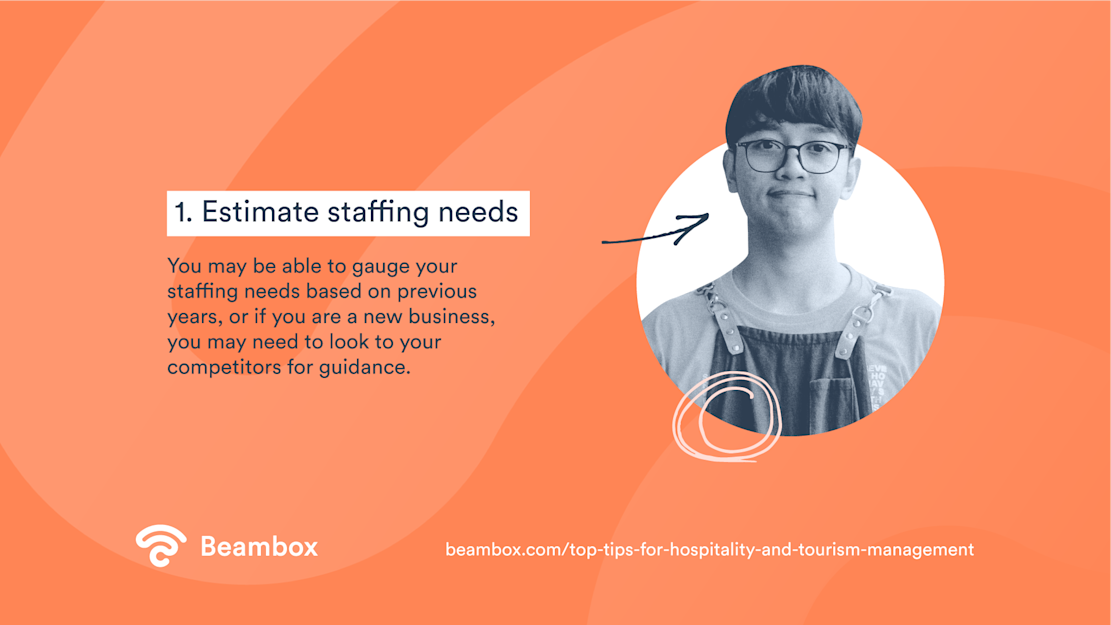
You may be able to gauge your staffing needs based on previous years, or if you are a new business, you may need to look to your competitors for guidance. Remember that you must hire more staff before the peak season starts so they will have time to complete training. Poor training can result in disorganized work, high turnover, reduced food hygiene, and low customer satisfaction, among other things.
Reconnect with past customers
Connecting with past customers can help two-fold. Firstly, you can remind people of your business and entice them to stay again. A targeted email marketing strategy will help you send out perfectly timed newsletters that recapture interest.
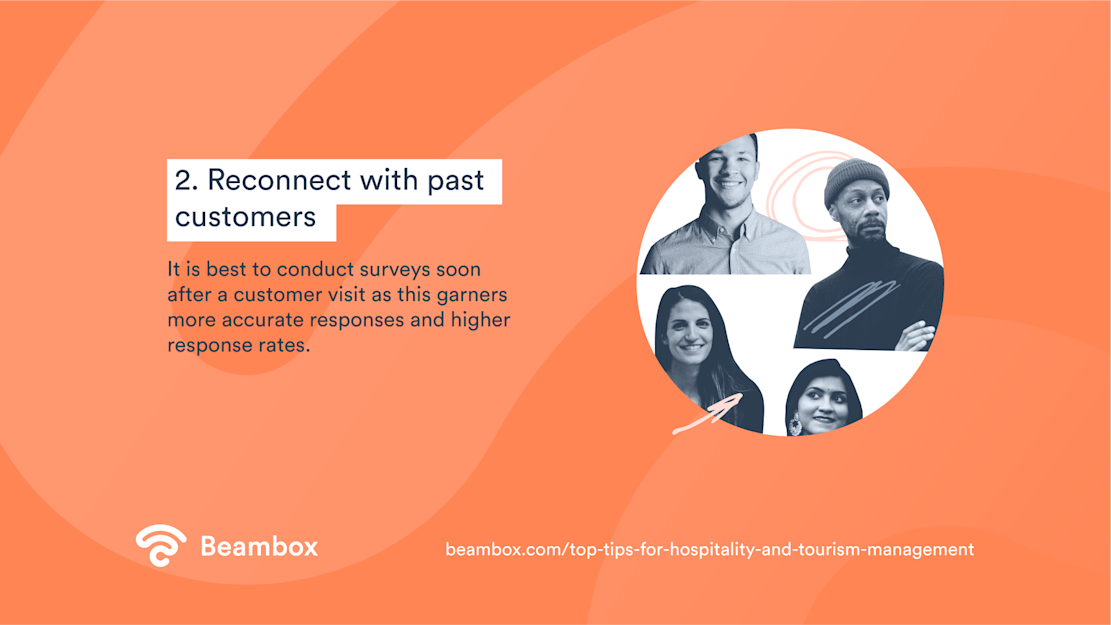
Secondly, you can also reach out to customers with surveys to determine what you did well and what could be improved. This information will help you provide an even more outstanding experience for your next customers. It is best to conduct surveys soon after a customer visit as this garners more accurate responses and higher response rates.
Collect data
Make the most of increased visitors. Get emails and relevant customer information so that you can send surveys and expand your marketing outreach.
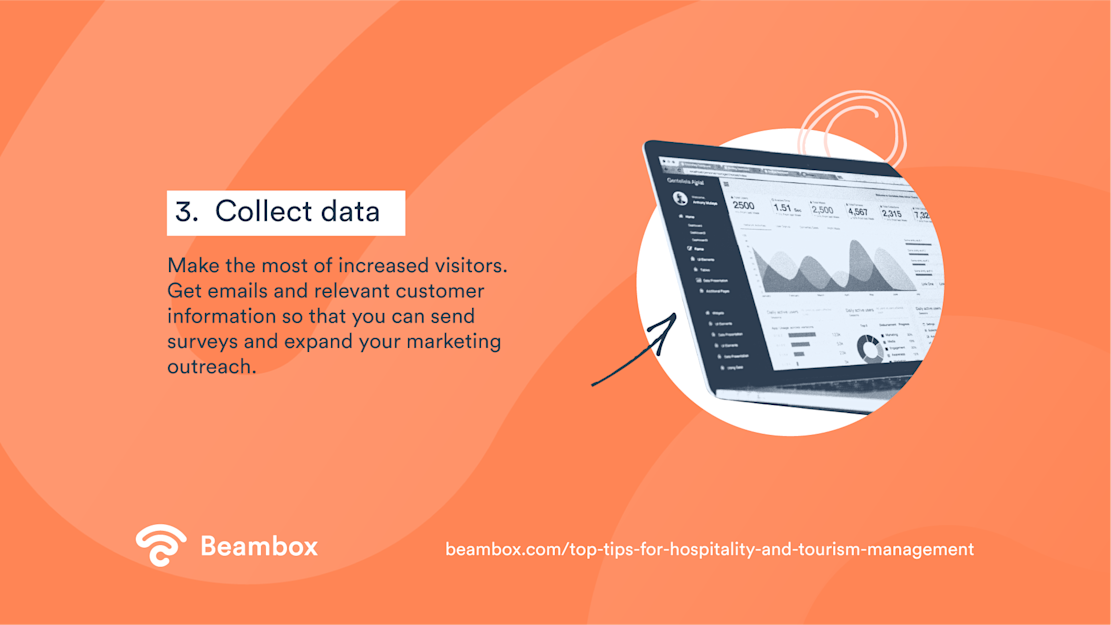
Collecting data might seem intimidating, but there are now solutions that make the process easier. For example, Beambox allows you to gather valuable customer data through wifi. So it is a win-win situation in which your customers get free wifi access, and you get the data you need.
Consider local events
Are there any seasonal or one-off events occurring in your area? Think about how you can attract these people and what your business can offer them. If you run a hotel, you will need to have rooms prepared for guests. But you should also consider things like provisioning and potentially even transport assistance if the event venue is a little further out.
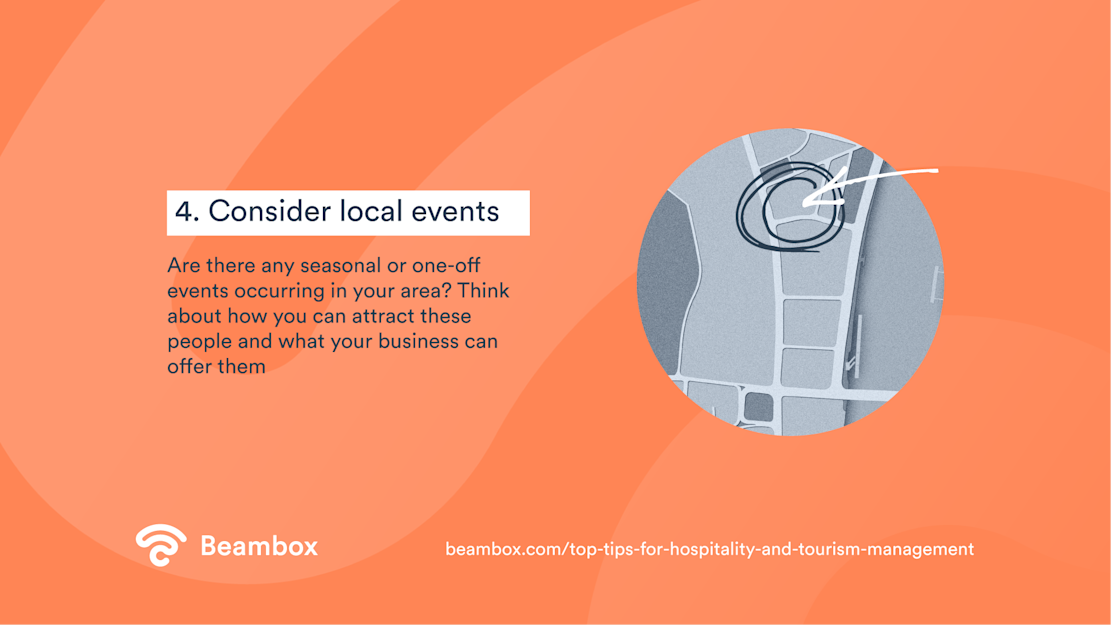
Know your limits
Be careful not to overbook your hotel or restaurant. Unfortunately, overbooking can result in negative reviews and reflect poorly on your hospitality management and business. Some businesses overbook in expectation of a certain number of cancellations. The issue with booking based on assumptions is that people are generally more likely to remember and write about a negative experience than a positive one, so you have to be extra careful.
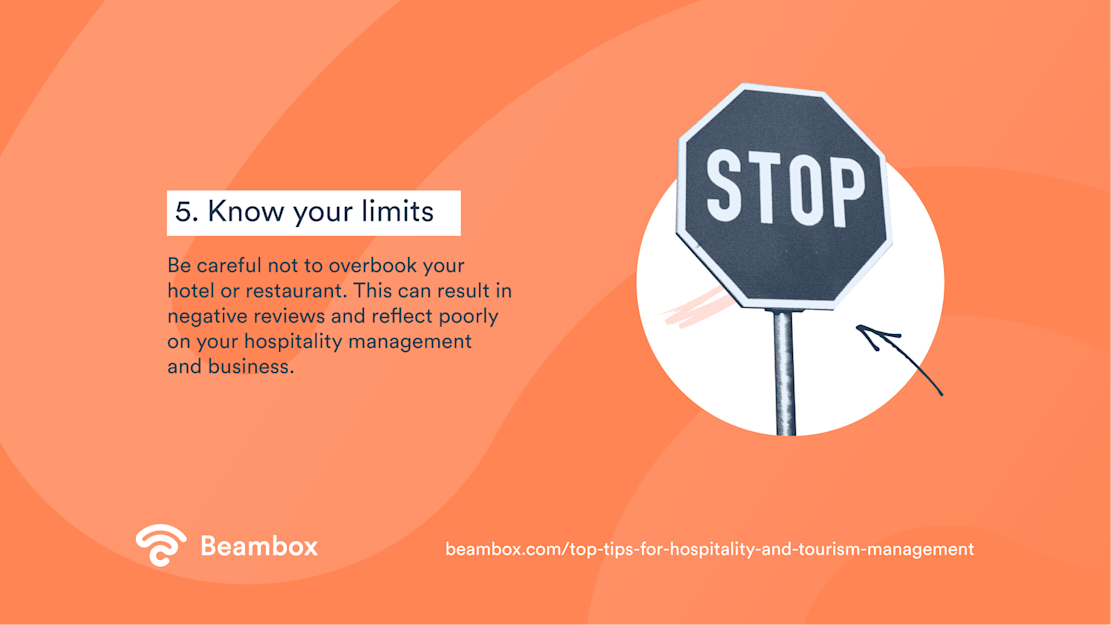
Additional information to help you make the most of peak season in hospitality and tourism management
Having a decent understanding of the hospitality and tourism management industry will help you navigate and predict issues. The more you know, the better prepared you can be.
To help you understand the industry and its future, we have listed some helpful information below.
The current state of hospitality and tourism management
Employment within the tourism and hospitality industry experienced steady growth in the US until 2020, when rates fell from 16.78 million in 2019 to 13.13 million.
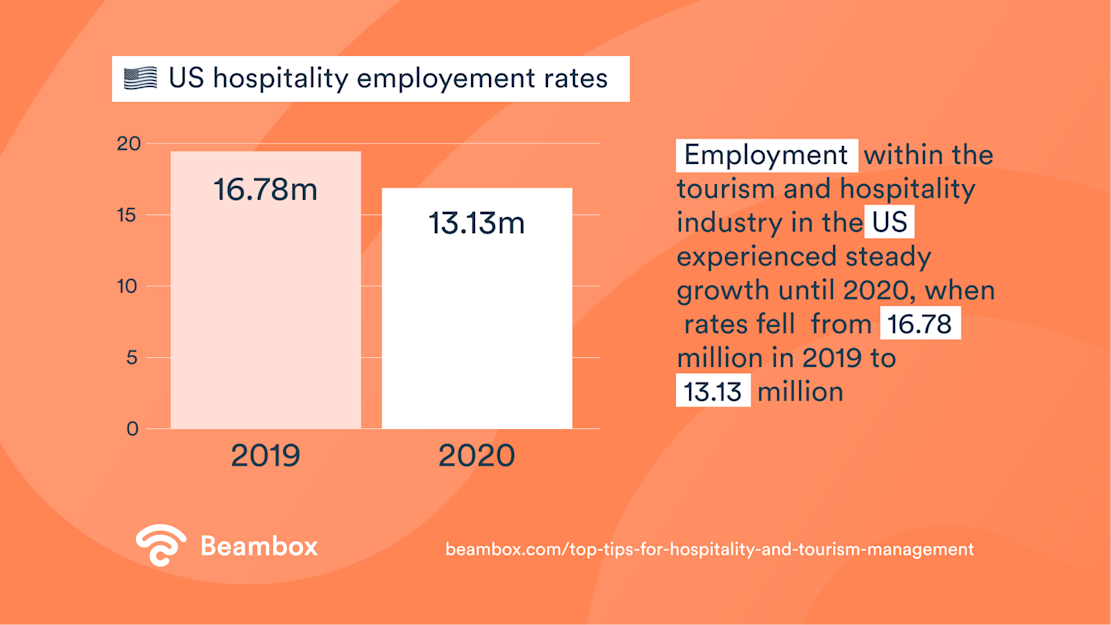
The Covid-19 pandemic affected jobs far beyond America. From 2020 to 2019, positions within the industry fell from 333 million to 271 million worldwide. Today, while employment still hasn’t fully recovered, job opportunities are back on the rise, with 289 million job opportunities available in 2021.
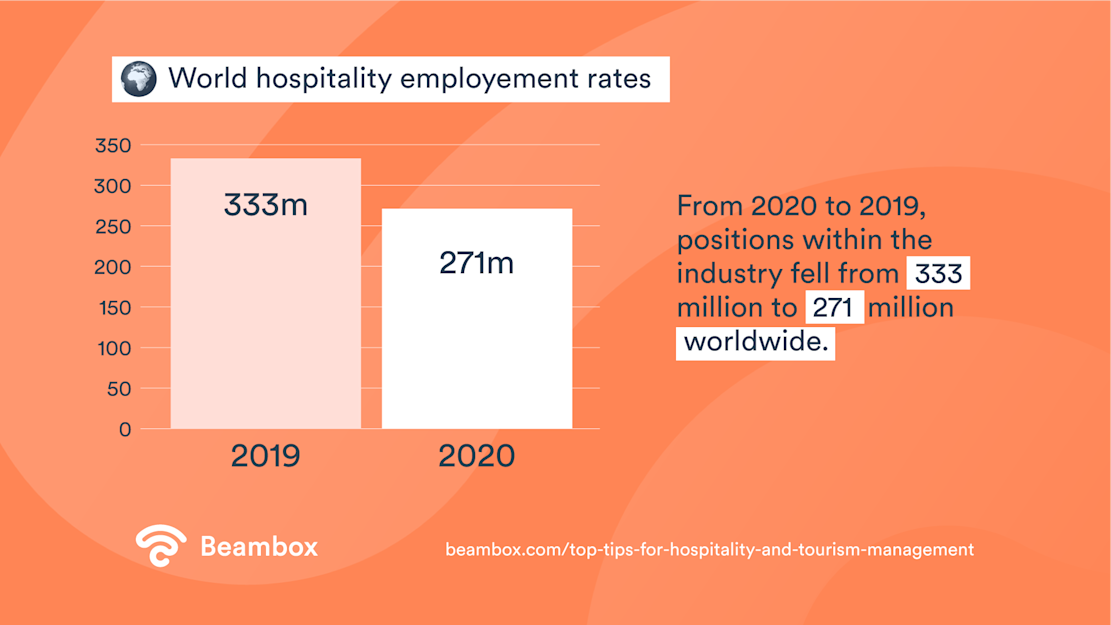
Now is a great time to invest and grow your business in hospitality management.
You will also find plenty of opportunities if you are considering opening a business in the hospitality industry. However, as with any venture, you must do your research and learn how to open a restaurant, cafe, or alternative business before you start investing your time or money too heavily.
The future of hospitality and tourism
Given recent world events that saw planes grounded and borders closed, it is no surprise that many individuals feel nervous about entering the hospitality and tourism industry.
The good news is that while international tourism is still bouncing back and has not yet reached pre-pandemic levels, domestic and rural tourism trends are driving growth. In addition, the restrictions of the pandemic changed the way many of us view the world around us and saw many people feeling more appreciative of the places closest to them.
After several years of difficulty during and following the Covid-19 pandemic, the hospitality and tourism industry is growing again. A compound annual growth rate of 15.1% is expected in 2022 (up to $4,548.42 billion). And this industry growth is expected to continue to rise over the next 5 years.
The biggest challenges facing the tourism and hospitality industry
As with most industries, marketing, mainly digital marketing, is becoming increasingly important. Whether you want new potential customers to know you are there or to remind existing customers you exist, a powerful online presence is critical.
Currently, Instagram is the best social media platform for marketing in hospitality, followed by Facebook.
As people spend more time online, it becomes easier to look places up before or while visiting. Because of this, people today expect to be able to see things like menus, pictures, and reviews online. Visitors use these resources to help inform their decisions at almost every step.
Businesses that want sustained growth in the hospitality industry, during and beyond peak season, must learn to embrace online platforms to connect with their customers.
Get Started With Free WiFi Marketing
Beambox helps businesses like yours grow with data capture, marketing automation and reputation management.
Sign up for 30 days free

